Andrew Tepper of eGenesis
Interview - we talk to the creators of A Tale In The Desert, a novel new massively multiplayer game
It's not very often that the massively multiplayer genre comes up with a radically new idea, but A Tale In The Desert has done just that. Replacing the usual stats obsessed power levelling of most online games with a more co-operative, constructive approach, it's already attracted something of a cult following during recent beta tests. We spoke to designer Andrew Tepper to find out what the future holds for this unusual game, and to give you a chance to try it out for yourselves.
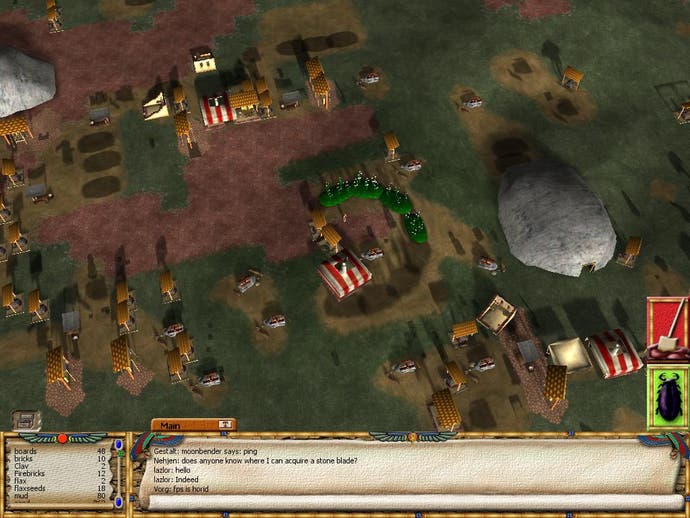
Fundamentals
Andrew co-founded eGenesis way back in 1998 along with partner Josh Yelon, with the aim of creating an entirely new kind of massively multiplayer game, one "where players must rely on and outwit each other to do well". "When we founded the company we knew exactly what form these games would take, but didn't have a specific game in mind. We knew that players must be able to have a profound impact on the game world, so we invented a legal system. We knew that players would need tools to organize themselves to accomplish large tasks, so we invented a grief-resistant contract and reputation system. Then we spent the first two years creating technology to let us build this specific kind of content very fast, and the last year and a half continuing to refine that technology, and building A Tale In The Desert." "The design of almost every other MMORPG is based on taking a fundamentally single player game - one where you're the hero - and making it so that many people can play at once. Now you can hack at monsters in packs, you can sometimes battle other players, you can trade, but you're really just doing all the things that you do in single player games. We did something fundamentally different. From the very beginning our thought process was, how can we force people to interact?"
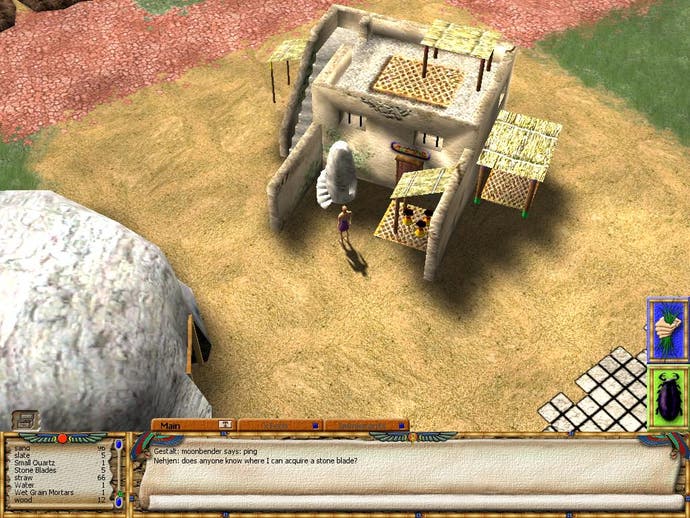
How To Make Friends And Influence People
And the answer was to encourage players to take part in forty-nine tests spread across seven disciplines, inspired by the ancient Egyptian setting that forms the game's backdrop. These tests advance your character in the world, but most of them will require you to work alongside other players. "The tests in each discipline force interaction in different ways. The discipline of Worship stresses co-operation - players engage in rituals together. To excel in the discipline of Leadership you must persuade or manipulate your fellow players, while the Discipline of Art and Music focuses on impressing others." "One of the first tests you're likely to encounter is the Test of Mentorship in the discipline of Leadership. When you log in for the first time, you will likely be greeted by an established player offering to be your Mentor. He or she will show you around the game and teach you how to get along in the world. After about 90 minutes you will have the option to build a shrine in honor of your mentor. There's nothing to gain by building such a shrine; in fact, it takes some time and requires materials. But it does help your mentor to pass the Test of Mentorship. So, what's the best strategy in being a mentor? You have to make your students want to do you a favor. To pass the Test of Mentorship and become a Level 1 Leader, you have to make people like you. This is fundamentally different from other MMORPGs."
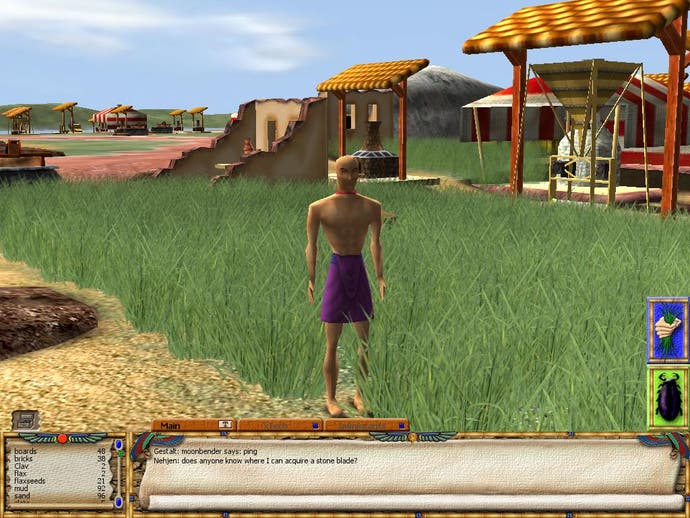
Reinventing The Wheel
Another aspect of the game where players must co-operate is in developing new technologies, and so unlocking new resources, objects and buildings. In recent beta sessions this cultural advancement has been taking place at a breakneck pace as players and guilds pour their resources into uncovering new technologies, but Andrew confirmed that "we've sped things up for the beta [and] it won't go quite that fast in [the final] release". "Also, since we limit play sessions to specific blocks of time, many beta testers try to be in game for 100% of that time. During the 56 hour session quite a few people were playing nearly the entire time, occasionally taking a break to catch a few hours of sleep. I doubt that anyone will maintain that schedule for a whole year!" And despite this increased research rate, we've still only seen the very early stages of the tech tree. "There are certain events and 'breakthrough technologies' that shake things up a lot as the story unfolds", Andrew explained. "We've released a few of these so far in the beta sessions, and have many more planned." Something else that will change when the game is released is travel. At the moment players can take a shortcut to key sites such as universities and schools (where you go to learn new skills) using a chariot, but this is only a temporary measure. "It's very important to make it so that certain kinds of goods are plentiful in some areas and rare in others, so no form of transportation will be instantaneous. Having automatic or instantaneous transportation homogenizes the game and eliminates regional culture. We've discussed other limited forms of transportation, but have not yet added them."
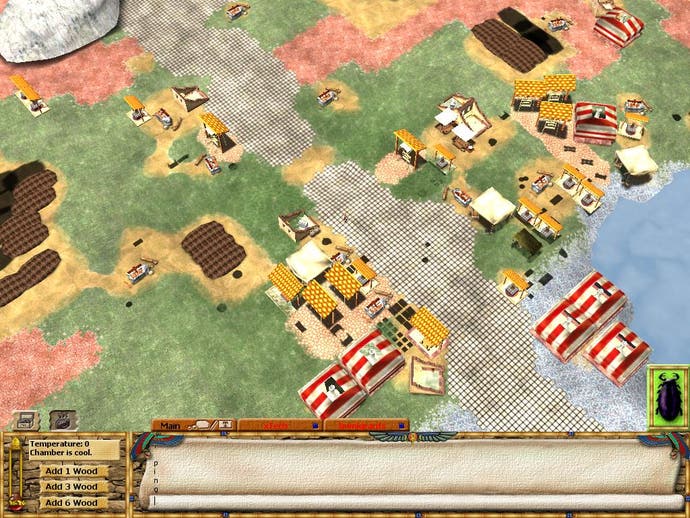
Big City
Another issue that has raised some concern during testing was guilds, and particularly the growth of "super guilds" which could potentially dominate the game. Andrew doesn't seem too concerned about these though, pointing out that "they don't work" in the long run. "Once a guild gets big enough that not all of the members know and trust each other, there's always a traitor who ruins it. The successful guilds have learned this and are careful about expanding too big, or they keep certain of their buildings privately owned." These buildings can vary from small carpentry tools and brick racks to charcoal furnaces and hefty mines, and one of the potential problems which has cropped up during the beta is urban sprawl. As players construct new buildings in prime spots, entire regions of Egypt can vanish under a near solid mat of houses, stalls, workshops and flax fields. Part of this is down to the current transportation system, with players tending to clump around starting areas and chariot stops, but is overcrowding a cause for concern? "The land mass is big enough so that if you want to locate away from the clutter, there is plenty of space", Andrew told us. "We're also adding more of certain resources so you won't have to be near very dense areas. Still, there will be places that are crowded and start to look like a city, and other places that are sparse. But that's all part of the game."
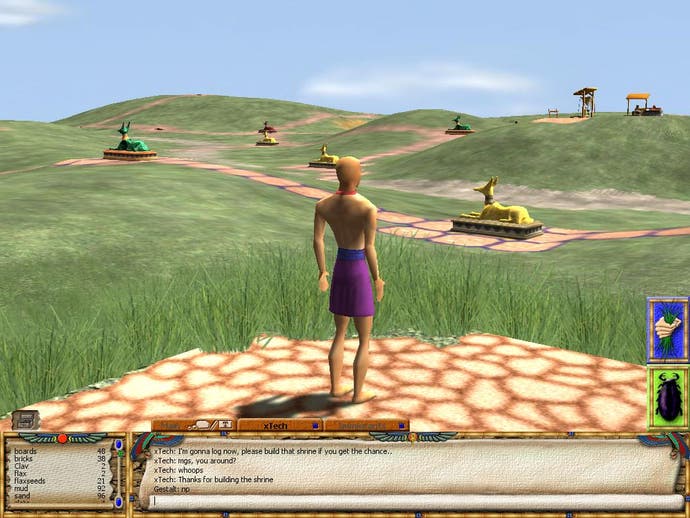
We're An Anarcho-Syndicalist Commune
The beauty of A Tale In The Desert is that if you don't like something, you can always try to change it. So if overcrowding is getting you down, simply propose a law to limit how closely packed buildings can be. "Any player can visit the Great University of Leadership and create a petition to change the game rules in some way. For example, here is an actual petition that was recently introduced: 'Building any structure within ten feet of a road or path shall be illegal. Structures already placed shall be allowed to stay.'" "The player that introduces the petition must then gather signatures from others in order to force a vote. During this beta cycle, 35 signatures are needed, and this petition gathering can be shared among a group of supporters. Using the chat system, they would ask others in the game to click on their character and read the petition via a menu, and if they approve, sign it. Once 35 signatures have been turned in at City Hall, that triggers a game-wide vote, which must pass by a two thirds majority." "When a vote passes, the developers change the game rules to reflect the new law. Our technology allows [us to do] this without bringing down the server, and without kicking anyone off. During the beta cycle, laws have typically been implemented within an hour of passage, so for most things it's pretty easy for us to make changes. Because laws could technically make any change in the game, we do have a few ground rules about what kinds of laws get vetoed though, which we have discussed at length in our forums."
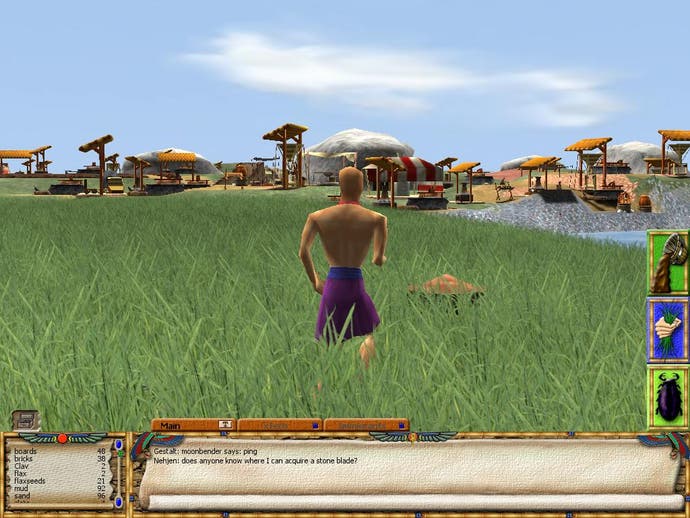
Try Before You Buy
At the moment the beta sessions are on a fairly small scale, with players numbers typically in the hundreds rather than the tens of thousands. For the final game though eGenesis hope to be able to handle far more players in a single world. "One 'server' is actually a cluster of Linux boxes designed to handle 15,000 players concurrently, which means that we can accommodate around 100,000 subscribers", Andrew told us. Initially things will be on a smaller scale though. "Because players can change the game rules by passing laws, maintaining parallel game worlds is a bit trickier than in other online games. So the plan for now is to just run one game server." All of which adds up to a rather unusual massively multiplayer game, with no killing, no experience points, no monsters and no loot. Instead you get a character advancement system built around completing tests and buying new skills, with gameplay that focuses on working with other players to further your own goals and develop the world in which you live. This style of play obviously isn't going to appeal to everyone, but it does make a welcome change from the hack and slash games that currently make up the vast majority of the genre's releases. And if you haven't already tried the game for yourself, now's your chance! eGenesis have kindly arranged for the next beta session to take place at a more Euro-friendly time following the posting of this interview. Simply grab the latest version of the game (which is only 55Mb) from the Tale In The Desert website and sign up for the test here. The servers will open at 5pm GMT on Friday 29th March and remain online for twelve hours, through into early Saturday morning. If you miss this session, all is not lost - there should be another one some time next week. So what are you waiting for? Grab the beta and get baking those mud bricks!
-
A Tale In The Desert screenshots

